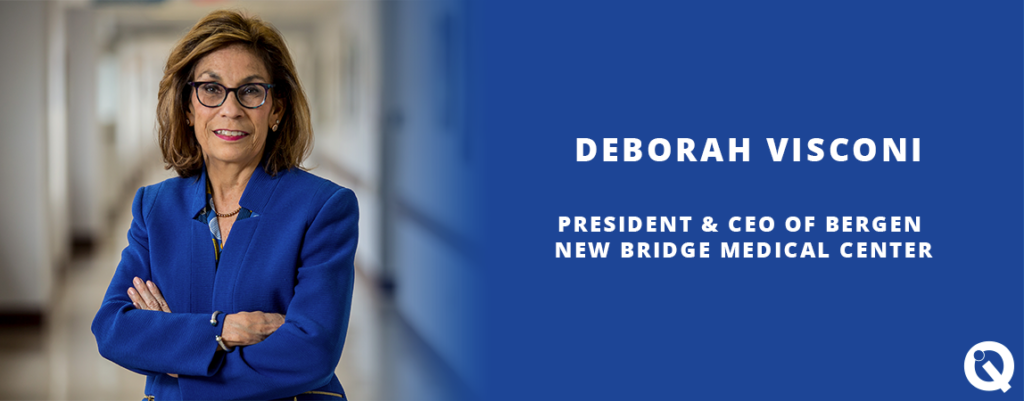Deborah Visconi is President & CEO of Bergen New Bridge Medical Center, one of the newest members of our Provider Council.
How has COVID-19, and the mandate to socially distance, affected the patients you serve?
Bergen New Bridge, with 1070 beds, is the largest hospital in the state of New Jersey with niche service lines that require innovative, non-conventional approaches to assuring access to care. In addition, as a safety net provider, we care for the most vulnerable populations.
Recognizing how difficult a social distancing mandate would be on those we serve, we committed to continue providing all of the services we offer — from inpatient to outpatient to medication assisted treatment programs. For the mental health community, we maintained inpatient services from the onset of the virus and will continue to do so throughout; that means patients needing inpatient care can be admitted into the hospital to receive the appropriate level of care required. To make sure everyone was safely cared for, we cohorted individuals who tested positive for COVID-19 onto a specific unit. We were able to keep many of the behavioral health patients who had a positive COVID-19 test on their behavioral health units so that they could take advantage of all the necessary services in a safe environment. Our outpatient behavioral health programs were transitioned to telemedicine immediately to assure access to all the services our patients needed.
With a steadfast commitment to assure our substance use disorder patients continued to receive care, we remained open for all in the community that needed us, offering our intensive outpatient services with smaller groups in socially distant settings. We were also able to continue to admit patients who needed medical detox throughout the pandemic. In addition to that, the 12-step programs for Narcotics Anonymous and Alcoholics Anonymous were offered outside on our campus to assure these services were available for those in need.
And how have you changed your protocols given the shortages of testing supplies and PPE?
From the start, we communicated with our frontline staff, our medical providers, our doctors, and our union leadership as it related to the proper use of PPE. We were fortunate never to run out of anything. We educated our staff to be certain PPE was used properly, we sourced PPE from many non-conventional vendors, and being a public hospital, the County of Bergen was very helpful in making sure that we always had a strong and steady supply of PPE available to us.
For all of our populations, we were able to address creatively and innovatively how to provide the services we, offer including the use of telemedicine. We have a very large long term care division as part of the Medical Center. This is a very vulnerable population. Recognizing this, early on we jumped ahead of the guidance by suspending our visitation, limiting our movement throughout those units, thus reducing the COVID-19 exposure to that division and we cohorted those residents that were COVID-19 positive to minimize exposure to others.
Recently, Bergen New Bridge Medical Center announced that you would be opening an LGBTQ Healthcare Center. Can you tell us why this is important to your organization?
Our community health needs assessment really brought the gaps in care for the LGBTQ community to light. I strongly believe it is critical that we stand up and address those needs. Our health center is going to open before the end of the summer. We will provide behavioral health and mental health services in addition to our substance use disorder programs in addition to medical specialties like endocrinology, women’s health services, men’s health services and all around wellness. We will be able to serve all comers in a stigma-free, welcoming environment.
When Bergen New Bridge Medical Center became a full-service acute care hospital, you made the decision to participate in the Leapfrog Hospital Survey. Tell us why that was important
Transparency and safety are really the hallmarks of our leadership here. We believe it is critical to improving quality and outcomes. Being honest with patients builds trust and strengthens the relationship between patients and providers. Transparency allows continuous feedback for the consumers, which helps improve clinical outcomes, efficiency, and our overall patient experience.
You were among the first users of the NJHIN (New Jersey Health Information Network). How has participating in NJHIN helped you serve patients?
We were the first hospital in New Jersey to participate in the HIN. We recognized several areas of opportunity with being part of the HIN that allows us to gain a better understanding of our patients’ needs as they come to us with chronic conditions that have been untreated, potentially with drug seeking behaviors. We can see if an individual has been to other hospitals with the same type of conditions. More importantly, we can look into social determinants of health and identify chronic diseases. Patients who are frequent users of the emergency department often have chronic conditions that have been untreated. If we identify that upfront, because we are a full-service, acute care hospital, we can refer these individuals to our ambulatory care center, where we have primary care doctors and specialists to treat their chronic conditions.

